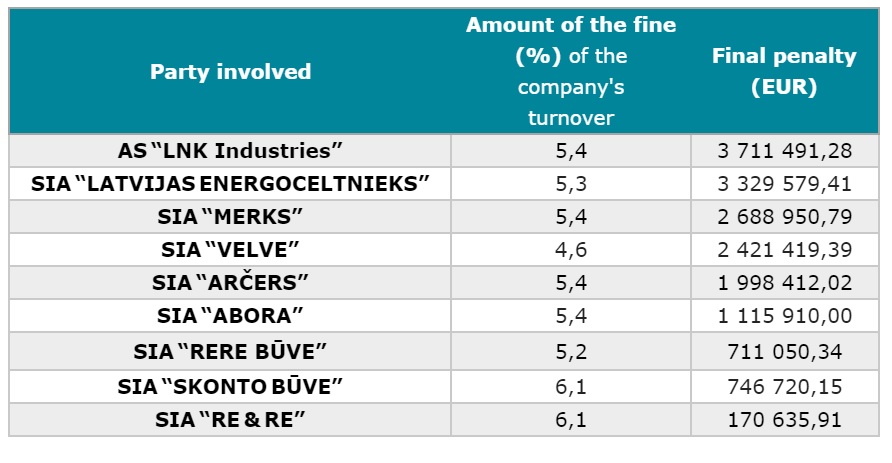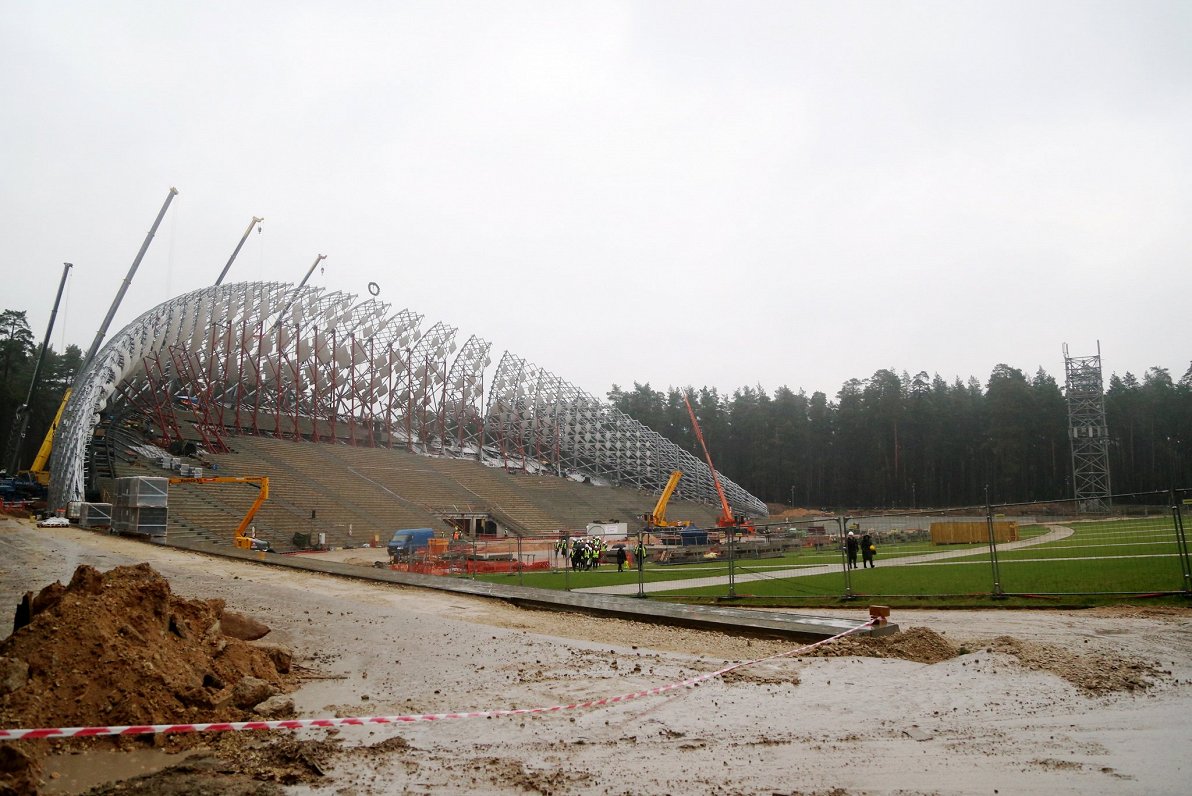On July 30, the Competition Council (the CC) adopted a decision in the so-called “construction companies’ cartel” case, detecting a long-term prohibited agreement of ten construction companies on the conditions of participation in public and private procurements in Latvia.
As a result, a fine totalling 16,652,027,40 euros was imposed on companies for the violation of the competition law.
Based on information provided by The Corruption Prevention and Combating Bureau (KNAB) and additional evidence obtained during the investigation, the Competition Council found a violation of the Competition Law prohibition specified in Article 11, Paragraph one and Article 101 (1) the Treaty on the Functioning of the European Union in the activities of SIA “SKONTO BŪVE”, SIA “LATVIJAS ENERGOCELTNIEKS”, SIA “VELVE”, SIA “ARČERS”, SIA “RERE BŪVE”, SIA “RE & RE”, SIA “RBSSKALS Būvvadība”, SIA “ABORA”, AS “LNK Industries” and SIA “MERKS”.
"From the transcripts of the builders' audio recordings submitted by the KNAB, it can be concluded that the representatives of the largest construction companies discussed the conditions of participation in the procurements at least 12 times in total in a period from 2015 to 2018. They were meeting at least three times a year to distribute procurements. In total, almost 90 procurements were discussed during these negotiations, of which the CC identified at least 70," said the CC.
The parties of the case agreed on both private and public procurement, including European Union (EU) co-financed procurements, the CC added.
"The CC, performing the analysis of the case materials, concluded that the construction companies had been divided into two groups - “Group No.1” and “Group No.2”, which tried to divide the procurements among themselves according to the principle “half to half” or so that between the two groups, the totals by amounts would be as similar as possible. Among other things, the negotiations discussed the potential winner of the procurement who would be entitled to the particular procurement and the formal participation with a “cover offer” or, conversely, non-participation in the procurement."
To facilitate the procurement distribution process, notes were used, where the distribution of procurements was hidden. During the proceedings, the notes came to the attention of the KNAB and later to the attention of the CC.
The scale of the cartel was huge, according to the CC.
"The CC identified at least 70 out of almost 90 negotiated procurements, of which most were concluded with contract with the total contract amount of 686,989,991 euros. Thus, when companies agreed on the distribution of procurements and conditions of the participation in procurements, the procurement organizers did not receive offers from competing bidders but only simulating competition, which distorted the construction market in the entire territory of Latvia," the CC said.
"In addition, the cartel affected fair and legal use of public funds, including use of EU funds. The obtained data shows that more than half of the procurements were made with EU co-financing. Procurements also varied in scale, with the smallest contract amount being less than one million and the largest over 100 million euros. However, the averages show that most purchases have been in the order of several million euros."
The allegedly rigged contracts extend into all manner of construction projects, including some of the highest-profile ones in the country. They include educational institutions, shopping centres, medical institutions, sports centres, stadiums, radioactive waste bins and even law enforcement agencies.
The builders' prohibited agreement was, for example, on the procurement of Mežaparks Open-air Stage, Rīga Technical University, the New Rīga Theatre, Ventspils Concert Hall, Culture Palace “Ziemeļblāzma”, Latvian Occupation Museum, as well as many others.
Moreover, the cartels were based not only on public procurement but also on private procurement, such as the construction of the shopping and entertainment centre “Akropole”, the reconstruction of shopping centre “Alfa” and the construction of the “Rimi” logistics center.
Taking all those into account, it's difficult to think of many significant construction projects in the last decade that weren't within the grasp of the cartel.
According to the CC, transcripts of audio recordings confirm that the parties were aware of their illegal activities and therefore acted in a covert manner, repeatedly reminding the interlocutors to “leave the phones out of the meeting place” and not to use the word “scheme” but “common understanding”. The CC also concludes that the parties were aware of the incompatibility of their actions with competition law, indicating in the conversation: “But in principle, we have to be careful with the Competition Council. Care must be taken...”.
Juris Gaiķis, the Chairman of the CC: “For many years, the environment of organizing and conducting procurements has been distorted. As reflected in the transcripts of the audio recordings and the procurements, the negotiations analysed in the case show that there was no free competition in them, which was affected not only by the builders' own agreements but also in some cases by possible procurement organizers support. Although the contracting authority was aware of the existing cartel in certain cases, it did not report this illegal situation to the CC, which is not acceptable, because these persons are most directly responsible for the fair use of public and EU co-financing.”
The companies involved were fined differing amounts based upon how long they had been part of the cartel, their individual turnover and how cooperative they were during the investigation. One of the firms involved, SIA “RBSSKALS Būvvadība” has been liquidated, so only 9 fines were issued.





























